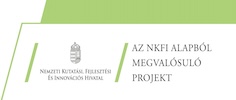The venture capital company of Óbuda University, Obuda Uni Venture Capital, has been established with a raised capital of ten billion HUF, allowing financing opportunities for university innovations of up to 300 million HUF per project, as announced by Prof. Dr. Levente Kovács, the rector, at the institution's opening ceremony. As he expressed, their primary goal is to cultivate a strong startup culture at Óbuda University. This includes an innovation ecosystem that involves newly affiliated high schools, enhanced talent development, scholarships, and strengthened specialized colleges. In addition to these initiatives, they are launching the Innovation Management Doctoral School and a venture capital company with a substantial financial base, providing real support for innovation.
The shift in the model has opened up new horizons for Óbuda University, emphasized Prof. Dr. Kovács Levente. As he put it, they have invested the increased resources wisely and consistently, resulting in a significant increase in student enrollment and advancements in international rankings. This success has enabled the university to establish a distinctive identity in the field of Hungarian technical higher education, focusing on the utilization of innovations. Óbuda University has become successful by increasingly collaborating with players in the domestic economy. This mindset has led to the integration of innovation management into their education. This development not only includes the university's newly established fourth doctoral school but also positions the university as the country's first investing university, supported by the maintaining foundation and the financial participation of Széchenyi Funds.
Addressing the students, Dr. András Cser-Palkovics, Mayor of Székesfehérvár and President of the Rudolf Kalman Óbuda University Foundation, pointed out that students can pursue their studies at a university with stable and secure infrastructural, financial, professional, and legal frameworks. He added that the university's leadership has every reason to be proud of this year's newly admitted student body. To ensure continued growth, the foundation will continue to provide the necessary conditions, and the academic side will continue to enjoy maximum autonomy.
Thanks to the successful model shift, Hungarian universities are advancing in international rankings, strengthening the competitiveness of the Hungarian economy, emphasized Mihály Varga, Minister of Finance. He highlighted that Óbuda University has become one of the country's most popular universities. As the former Chairman of the Rudolf Kalman Óbuda University Foundation's Board of Trustees, he mentioned that more than 4,100 students were admitted this year, a record high. The government has successfully connected Hungarian universities with the bloodstream of the economy, leading to increased collaboration opportunities and corporate relationships. In line with this effort, Óbuda University has launched a venture capital fund to directly support startups and spin-off businesses originating from the university.
Dr. Veronika Varga-Bajusz, Deputy State Secretary for Higher Education at the Ministry of Culture and Innovation, stated that Óbuda University has utilized all the opportunities offered by the new competitive university model to promote Hungarian creativity, knowledge, and intellect. The number of students admitted to technical programs has significantly increased nationwide, with Óbuda University performing exceptionally well. It has become a significant institution in the fields of engineering and computer science. It operates in both Budapest and regional locations, fosters international connections worldwide, and ensures the connection between universities and the economy. Its responsibility extends to the Carpathian Basin. She added that with the dynamics of recent years, no goal is beyond the institution's reach.
Awards:
Following the speeches, Prof. Dr. Levente Kovács, the rector, and Dr. András Cser-Palkovics, the chairman of the board of trustees, presented awards.
The title of Honorary Professor was awarded to individuals who have achieved outstanding recognition nationally and internationally for their professional performance. The recipients were Imomov Shavkat Jakhonovich, Rector of the Institute of Irrigation and Agricultural Mechanization Engineers in Tashkent and Director of the Bukhara Institute of Natural Resource Management, and Botir Usmonov, Professor and Rector of the Tashkent Institute of Chemical Technology.
In the second year of the Excellence Application System, three highly recognized and qualified researchers joined Óbuda University's research and development program, and one colleague received an Excellent Consolidator Researcher grant. The Distinguished Professors Award recipients were Prof. Habib Zaidi, leader physicist of the University of Geneva Hospital and head of the PET Instruments and Neuroimaging Laboratory, and Prof. Peng Shi, an esteemed professor at the University of Adelaide in Australia.
The recipient of the Foundational Researcher grant was Prof. Dr. Tamás Haidegger, the director of the University's Research and Innovation Center.
Student Council Awards were presented as follows: Viktor Patrik received the Cultural Contribution award, Gyurka Márk Manó was named Athlete of the Year, Kruppa Bence was named Student of the Year in Public Life, and Hiervarter Ákos received the Public Life Educator of the Year award.
The Cooperative Partner of the Year award was given to Siemens Zrt. for its successful collaboration with the Kandó Kálmán Faculty of Electrical Engineering and Informatics Student Council, resulting in the creation of a new community space.
Additionally, recognition for their work was awarded to Dán Kitti Tristen, Füredi Anita, Hajdu Alexandra, Ádám Richárd János, and Béda Bálint.



